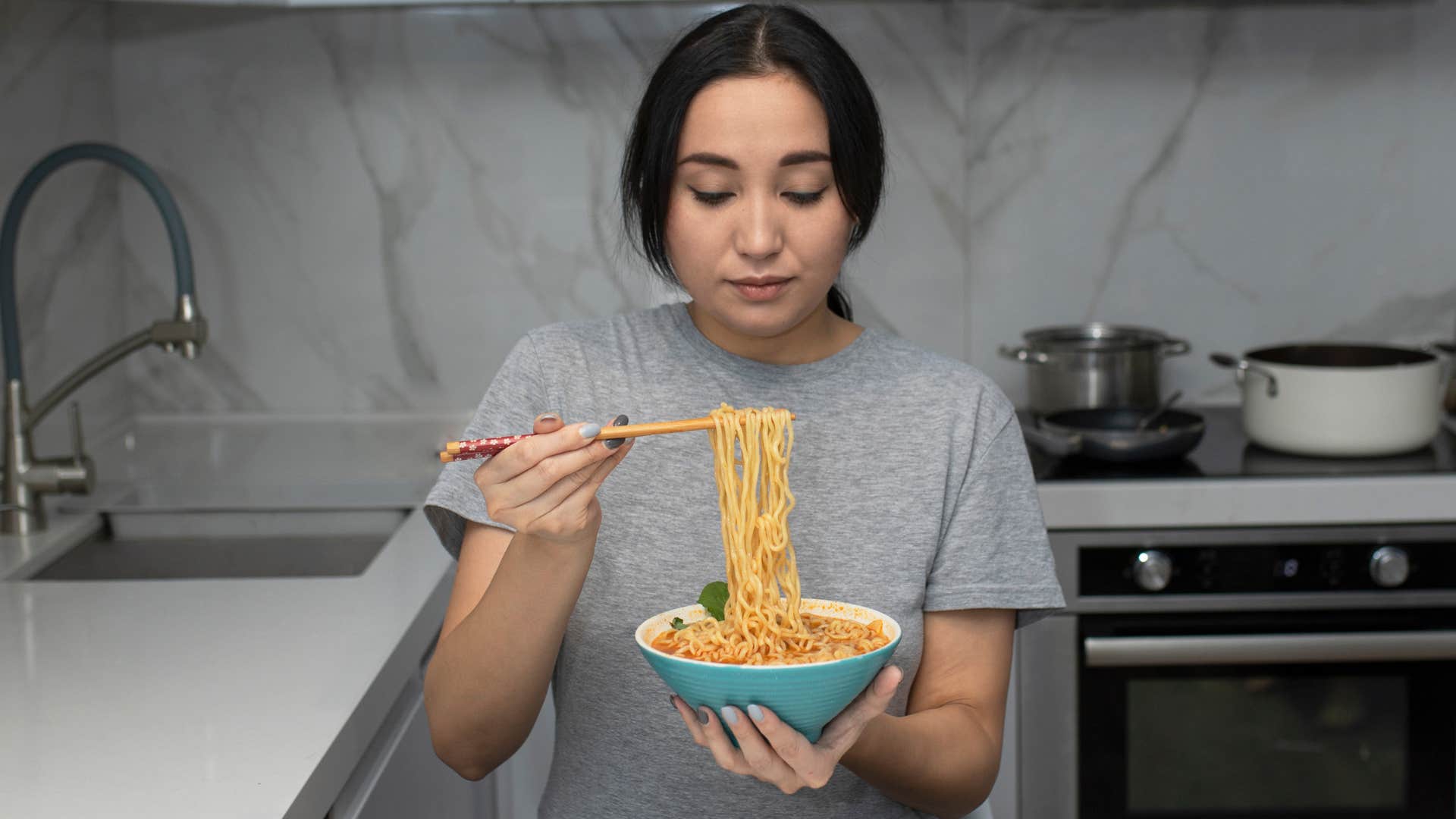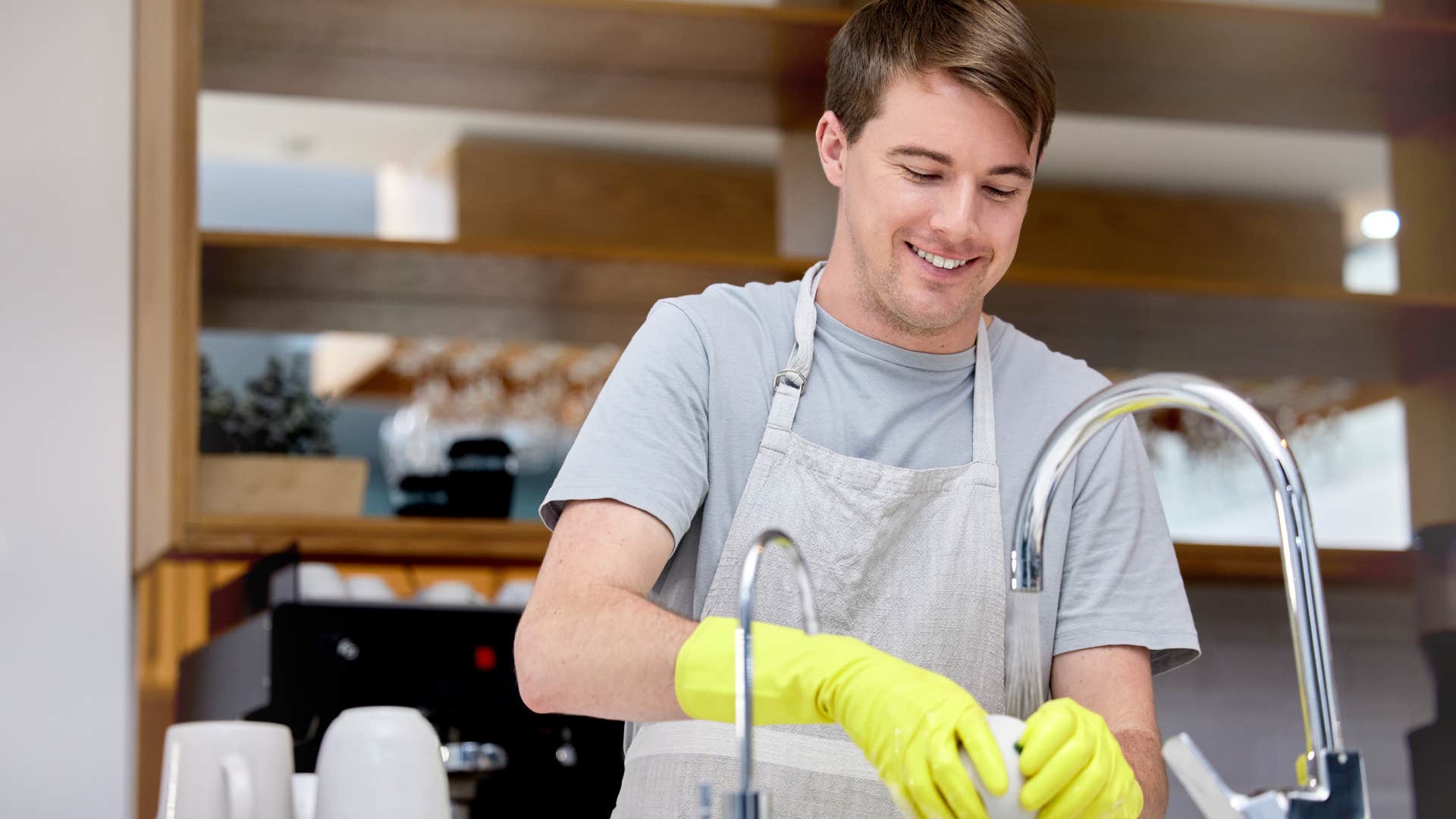11 Things In Someone's Kitchen That Reveal They're Emotionally Unequipped For Adulthood
Are these things more linked than we realize?
 MAYA LAB | Shutterstock
MAYA LAB | Shutterstock The key to being successful in adulthood — whether it's with personal health, relationships, or even career growth — is to maintain healthy habits. However, the key to making healthy actions into healthy habits, like a study from the British Journal of General Practice suggests, is having the right tools to cultivate a productive mindset. Whether it's in your house, in relationships, or rooted in your strategies and behaviors, the kinds of material and metaphorical tools you keep in your life are foundational to building healthy routines.
Even though it seems subtle and unsuspecting, that's part of the reason there are things in someone's kitchen that reveal they're emotionally unequipped for adulthood. Whether it's an overreliance on convenience, a misguided preference for comfort, or a lack of tools that the average person uses everyday, these kitchen tools and habits can also be emblematic of a person's habits, rituals, and routines.
Here are 11 things in someone's kitchen that reveal they're emotionally unequipped for adulthood
1. Only comfort foods
 ShishkinStudio | Shutterstock
ShishkinStudio | Shutterstock
According to a study from Physiology & Behavior, eating comfort foods can help to mediate feelings of sadness, stress, and anxiety in emotional eaters. While this may provoke an increase in life satisfaction and mood in the moment, these emotional habits and misguided coping mechanisms can prove damaging for physical and mental health in the long run.
That's why having constant access to only comfort foods is one of the things in someone's kitchen that reveal they're emotionally unequipped for adulthood. Having comfort food isn't necessarily unhealthy, but when someone lacks emotional regulation skills and instead turns to food every time they're faced with an issue or complex emotion, that could spiral into an unhealthy routine.
2. Fast food and leftover takeout containers
 Ground Picture | Shutterstock
Ground Picture | Shutterstock
People with a tendency toward anger and impulsivity — often common in people with lacking emotional regulation skills — often consume more fast food than the average person, according to a study from AJPM Focus. That's why having tons of leftover takeout and fast food containers are some of the things in someone's kitchen that reveal they're emotionally unequipped for adulthood.
If they're not practicing emotional regulation with healthy rituals and routines and instead relying on fast food convenience and junk food for comfort and distraction, it's no wonder they likely also struggle with forming positive social connections and combating loneliness.
3. Expired food
 aslysun | Shutterstock
aslysun | Shutterstock
According to licensed psychologist Rachel Goldman, there's a link between cleanliness, cleaning rituals, and a person's mental health. It's not just about having tons of clutter around — that's been shown to have a negative impact on mental health and well-being — it's also about the ritual and practice of cleaning that can have other positive influences on health.
From promoting better cognitive skills, to improving mood and mental health, and even carving out space for a person to practice emotional regulation — in the quiet mindful space that occurs while someone cleans — de-cluttering and forming cleaning habits are more powerful than we could ever imagine.
That's why seeing expired food or overflowing trash in someone's home is a red flag — it's a sign that they could be emotionally unequipped for adulthood, avoiding habits and behaviors that could cultivate space and healing in their routines.
4. Storage in their oven
 Dusan Petkovic | Shutterstock
Dusan Petkovic | Shutterstock
While people living in rentals and small apartments may actually need to leverage their appliance space for storage — using an oven for sheet pans without a cupboard to house them in — if this practice is a sign that someone is never cooking for themselves, it could be a red flag.
Evidence that someone isn't actively using appliances or cooking tools is one of the things in someone's kitchen that reveal they're emotionally unequipped for adulthood. Cooking for yourself isn't just associated with better dietary, nutritionary, and financial outcomes, it also has positive implications for psychological well-being.
When someone makes time to cook for themselves, they're carving out space for mindfulness, intention, and practice — three things that can make all the difference in someone struggling with self-awareness or emotional regulation. If they're not making this time or intentionally avoiding solitude practices, they're probably not emotionally mature enough yet in their current space.
5. Broken appliances
 Nicoleta Ionescu | Shutterstock
Nicoleta Ionescu | Shutterstock
There are certainly valid reasons why someone might have broken appliances or furniture in their home — from financial burdens to obstacles with free time — but if they're being intentionally avoided out of convenience or in pursuit of comfort, that could be a red flag that someone's emotionally unequipped for adulthood.
It's not always comfortable to address broken things, learn new skills to fix them, talk on the phone with a service worker, or budget to afford fixing something, but discomfort is a natural and normal part of adulthood. If we spend all our time and energy avoiding discomfort, we'll never grow, build better habits, or practice skills like emotional regulation that enhance mood, relationships, and life satisfaction.
6. Chipped glassware
 Krakenimages.com | Shutterstock
Krakenimages.com | Shutterstock
Drinking or eating from chipped glassware — even if it's subtle — has a number of safety concerns, which is why refusing to throw these items away or separate from a sentimental broken dish is a sign of someone who's not emotionally equipped for adulthood. First of all, these dishes can increase the risk of hurting yourself by swallowing glass or other dish materials and even getting sick, as the broken area tends to harbor more bacteria.
If someone refuses to buy new dishes, holds onto broken ones for longer than they should, or simply doesn't care about putting themselves and guests at risk, they're probably following similar misguided habits in other areas of their lives — like holding onto toxic relationships, refusing to clean in areas where they can't see, and putting their well-being at risk with unhealthy wellness practices.
7. No trash can
 Ground Picture | Shutterstock
Ground Picture | Shutterstock
While many people deserve grace in their early adult years — experimenting with identity, habit formation, and personal interests in their leisure time, rather than constant sterile practices like cleaning, planning, or organizing — certain things should be nonnegotiables. For example, having a trash can or having a basic level of hygiene are things that shouldn't be compromised no matter what.
Anyone that lacks these basic cleanliness habits probably isn't emotionally equipped for adulthood yet, and is still relying on convenience and comfort that ultimately negatively affects their well-being and mental health.
8. Food lacking nutritional value
 EgolenaHK | Shutterstock
EgolenaHK | Shutterstock
Whether it's a box of sugary cereal, fast food, or prepackaged ramen, basic foods lacking nutrition are some of the things in someone's kitchen that reveal they're emotionally unequipped for adulthood.
Of course, people are more likely to rely on convenience when they have less time — working full-time, managing children, or even dealing with financial struggles — so it makes sense that they'd have "ready-to-eat" options in their home.
However, for someone with the time and money to prioritize their nutrition, convenience isn't an excuse. There are plenty of ready-to-eat options available that have the nutritional content necessary for an adult, it just takes more effort, planning, and intention to find.
9. Dish soap as the only cleaning product
 PeopleImages.com - Yuri A | Shutterstock
PeopleImages.com - Yuri A | Shutterstock
While having dish soap in the kitchen is important for obvious reasons, having it be the sole cleaning supply in a person's home is a red flag. Even though it can help to clean appliances and kitchen counters, there's no overlooking products like vinegar sprays, bleach, or glass cleaner in someone's home — and using dish soap could only be adding more grime to areas you're trying to clean.
As for replacing hand soap, although it technically cleans your hands, dish soap isn't made for skin, so it can quickly dry your hands out and cause more issues than investing in products made for their use. If someone is over-reliant on convenience, not for frugality, but for comfort and laziness, that's one of the signs that they're not emotionally unequipped for adulthood yet.
10. An overused pan
 Motortion Films | Shutterstock
Motortion Films | Shutterstock
When it's time to replace a pan or a cooking pot, there's no ignoring it. Not only does it make cooking food harder and more inconvenient, it tends to negatively affect the taste and quality of the food you're eating.
That's why it's one of the things in someone's kitchen that reveals they're emotionally unequipped for adulthood. Not only are they sabotaging their meals and the convenience of cooking at home — urging them toward more costly and unhealthy options — they're regularly overlooking the choice to buy a new pan or replace the old one.
11. Mismatched Tupperware
 fizkes | Shutterstock
fizkes | Shutterstock
We've all fallen victim to the Tupperware cupboard — overflowing with a million different containers, many of which probably (and likely) don't have a matching lid. For some people, it's simply a matter of convenience; they shove everything in there and don't worry about it until the next time they need something from it.
However, for people who already lack emotional regulation skills, engaging in behaviors like this is a red flag. They're ignoring something that's clearly an issue, especially in cases where they have the money and time to simply replace them all.
Zayda Slabbekoorn is a staff writer with a bachelor’s degree in social relations & policy and gender studies who focuses on psychology, relationships, self-help, and human interest stories.

